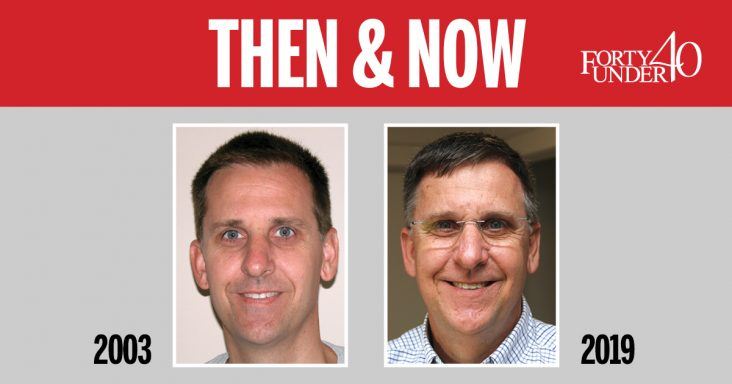Then & Now: Rod Sanders offers a niche for the ‘missing middle’
by June 7, 2019 2:10 pm 1,725 views

Editor’s Note: The following story appeared in the May 27 issue of the Northwest Arkansas Business Journal. “Then & Now” is a profile of a past member of the Business Journal’s Forty Under 40 class.
———————–
Over the past several years, downtown Bentonville has become a place where people can live, work and play.
According to a 2018 study commissioned by the Walton Family Foundation, it is also the largest of the five downtowns in Northwest Arkansas in terms of area, population and number of employees.
That hasn’t always been the case. Before Bentonville became the red-hot growth market it is today, Rod Sanders can remember a time when nobody wanted to live downtown.
“It was a hard market to get residents,” Sanders recalled.
The difficulties, in fact, led to a new strategy 20 years ago for family-owned Sanders Properties, a Bentonville-based business that was launched in California in the 1960s by Sanders’ father, Lavelle Sanders. Sanders said his dad — an Oklahoma native — moved the family to Northwest Arkansas in the 1970s for a slower, more rural pace of life.
Rod Sanders said because it was so challenging to entice anyone to live downtown, the company’s approach to business shifted in the late 1990s. Sanders Properties started focusing on a niche of long-term, older residents who were on lower or fixed incomes.
That’s still the company’s focus, he said, referencing affordable housing options for the “missing middle,” a term coined in 2010 by California architect Daniel Parolek to encompass what he called “a range of multifamily or clustered housing, compatible with single-family homes that help meet the growing demand for walkable urban living.”
“We have nice properties, we take care of them and we’ve been in this business a long time,” Sanders said. “We offer a high level of service and take care of our residents.”
Sanders, 55, has worked for the family business since 1988, and in 2003 he was recognized by the Northwest Arkansas Business Journal as a Forty Under 40 honoree. He said 16 years ago the Sanders Properties portfolio consisted of roughly 130 units spread throughout 21 locations in and around downtown Bentonville. Today, the company has 30 apartment units in five locations in the city. All of them are leased to long-term residents.
“We don’t use the term ‘tenants,’” Sanders said.
The company’s downsizing is also a shift in strategy. The company sold “a few” properties in 2013, then made a big play last year in three separate deals that were part of a 1031 exchange, a move that allows investors to avoid capital gains taxes when selling a property, as long as the purchaser buys a similar property with the profits.
A trio of eponymous limited liability companies paid Sanders Properties $9.23 million last summer for a combined 52, fully-leased rental units. Sanders did not name the new owner, only that it was a “developer who is interested in downtown Bentonville.”
With the money, Sanders acquired six Dollar General stores in south Arkansas. He visits the stores about once a month and is enjoying developing relationships in each of the communities — Blevins, El Dorado, Magnolia, Norman, Sheridan and Texarkana.
“It has been fun to learn a new part of the country and get to know new people,” he said. “People talk about Northwest Arkansas, and it is good here. But I love southern Arkansas. I love every one of our [Dollar General] communities and the people in them.”
Sanders was elected to the Bentonville City Council and served from 2004 to 2008, but resigned from the job and other civic endeavors because of Crohn’s disease. From 2007 to 2012, Sanders underwent three surgeries while battling the disease that “just about took my life,” he said.
Sanders said the symptoms are in remission, and he is in good health. He also returned to municipal work, receiving an appointment in 2014 by former Mayor Bob McCaslin to the city’s planning commission, a job he described as a passion.
Sanders’ son is a recent graduate of Ouachita Baptist University and his daughter will soon attend Moody Bible College. He said he’s looking forward to carrying on the discussion of “missing middle” housing options in his role as a city planning commissioner.
“The whole job of a planning commissioner is you don’t want people to say 15 years from now, ‘What in the world were they thinking,’” he joked. “You’d hope they would say, ‘Wow they did a good job with this.’”
